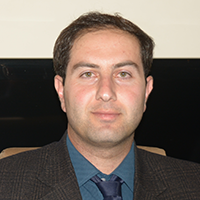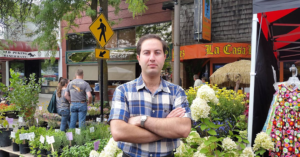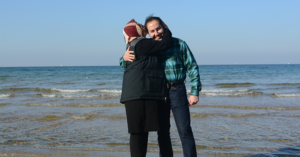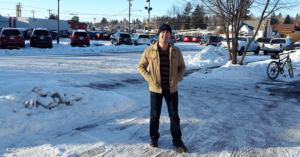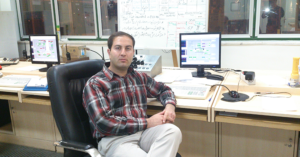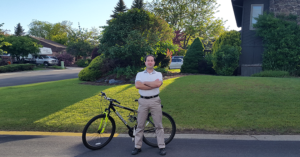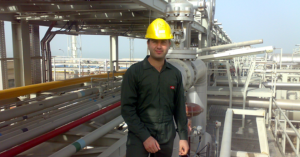Milad Nahavandi
The Window without Milad
I am sitting by the window in our house in Karaj, and I look at your pictures. Your pictures by the sea, behind your desk, in my arms in Turkey, when you took your father and I to get us visas to Canada. You said we should spend the Nowruz with you. What a fabulous Nowruz it would have been, by your side; in a house where we could watch from behind the window the snow that fell that very night. In a house where you would no longer be alone, by a Haft Sin we had designed together.
You wanted me to bring you wild olives and samanu paste from Malayer, and a little carved wooden table so that you could show your Canadian friends the handicrafts of your ancestral town. On that very table, we would spread our Haft-sin. I wanted to bring a bottle of grape syrup for you to gain some strength. It always gave you a new life. After all your studies, you needed it. I wanted you to have it and come sit by my side. For us to talk and relax.
Where are you now? Where are you? I want you to take my hand and ask me, your mother, to cry less. You are now hundreds of kilometers away, sleeping in a cemetery in the city of your birth.
My Milad, your coming was with pain and so was your going. Your coming, in the midst of the war, came under stress, and so did your going. I remember feeling the pain of childbirth while everything around us was burning in battles and bombs. It was the last day of the Persian month of Azar, in the year 1985. The bone-deep cold of winter had just engulfed our city. My pain lasted for ten hours. You just wouldn’t leave your safe place!
You were right, my son. You were right not to want to enter a world full of suffering, war, corruption, discrimination and favoritism. You did not want to come to a world in which you would do all that hard work, go through all that education to get yourself somewhere… only to be turned to ashes by a missile built by your own country, on the soil of your own homeland, in the heavens of your own motherland.
Maybe you knew. Maybe you wanted to stay right there in my tummy. We were ten minutes away from death when you finally came. You became my only son, my handsome, beautiful, cute little boy. The nerdy one at school who came third place at the elite Seyfie High School of Malayer, then got into Arak’s state university for chemical engineering. You did your MA at Isfahan University of Technology. After all that hardship and suffering, you went to Canada to start your PhD in chemistry. Did you know, Western University has given you an honorary doctorate now?
There was only a year left of your PhD. My great sorrow is never seeing you in your graduation garb, wearing the hat you deserved. I wish there was no PhD and you had stayed here for me. I wish you hadn’t been such a studious boy. I wish I had kept you in our house in Karaj, right here next to me. You went to look for a better life. In a country without discrimination, corruption and favoritism. If you had found a good job here, maybe you wouldn’t have left for the foreign lands at all.
For military service, they sent you to Sirri Island. You took night buses back to Tehran. It was still dark when you got into Azadi square and at 4 am, you were always exhausted and sleepy, but full of hope. You would go to Tehran’s Mehrabad Airport and climbed into one of those Russian Tupolev planes. Every time you boarded one of those I died a thousand times. I stayed up all night, every single time. I’d wait for you to land and let me know you’d arrived.
All your top grades, all your journal articles, all your coming top in university, your IELTS test, your GRE and those “seven ISI articles” you always passionately spoke about (you said 30 people had referenced them)… none of them came to your aid. Your offers from the University of Idaho or Canada’s Western University didn’t come to your aid. All that studying you did in Idaho, all your work in that lab in which you lost an entire chunk of your finger.
My dear Milad! Can’t you guess who shot the two missiles at your airliner? Do you know how they turned 176 people to ashes? Children, youths, the elderly, men, women. Do you know, they didn’t apologize even once?
But we buried you just how we wanted to. It was glorious. There were security forces all around, but they didn’t do anything. There was a large crowd around us too. You had dreamed of your own death. You had seen yourself sitting in a car, and the car being blown up by a missile. You said this was about something that had happened a few days ago. But you didn’t know that your own plane, too, was to be hit by a missile and this is how you would say goodbye to your homeland.
I still don’t know. The answer to this question and dozens more weigh heavily on my heart. I only know that I want to know the reason for this catastrophe. I want those responsible to be tried and punished in an impartial and just court. Maybe then I can get some relief. Maybe then I can believe that those who die in the pursuit of science are martyrs. Maybe I’ll believe that two angels came to welcome you and send you to paradise. Until then, I will wait.
Milad, I am mourning, and you know what mourning feels like. You, with your grand spirit and kind heart, know all about my suffering. You were the kindest one. When you came to Iran in December, you said you wanted to see every single person in the family and say your goodbyes. You wanted to come back and serve your homeland after you finished studying. You said you wanted to be with us, with your father, with your sister. You were worried in those last few days. One time you even said, “Mother! What if they hit our plane with a missile?”
Why didn’t I know right then that your fear would come true? Last night at the airport, you hugged your father tight, tighter than ever. You said goodbye to me twice. You bent and kissed my hands. I said prayers for you and had you pass under a Quran. “Cry less, dear mother,” you whispered in my ear.
As you were leaving, I got up on my feet to see you one more time. You waved to me from beyond the gate. When we got back home, I went and slept in your bed. It still smelled of your perfume. Wherever I go, I can smell you. I can feel your hands, your beautiful face, your wide chest, your quiet eyes. Hands that were torn apart. A face that burned. A chest that exploded to pieces. Eyes whose light was taken.
My Milad! Every morning, I gather up my pieces, torn apart by pain, suffering and tears, to try to stand upright and live on. I want to see a day when those who shattered these 176 innocent lives will be tried in a courtroom. My name is Fatemeh Amiri, mother of Milad Nahavandi, a retired high school teacher of social sciences. And I will stay alive until I can be avenged for your blood.
Writer: Bita Malakooti
Translator: Arash Azizi
Editor: Hannah Somerville
With the support of iranwire.com
